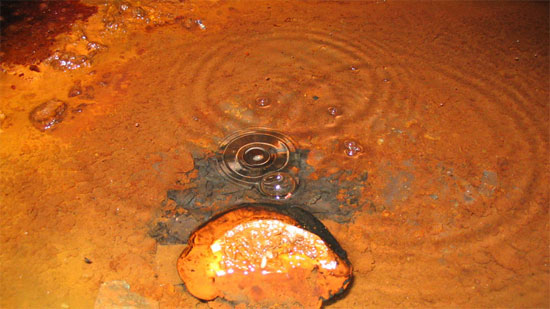Detected 3 billion years old water
Scientists have found 3-billion-year-old water bags lying in rocks at a depth of 3.2km underground in Ontario, Canada.
>>> Found 2 billion years old water
The results of the study, published recently in the journal Nature, are immediately recognized by scientists as one of the extremely important findings. According to the project team, this 3-billion-year-old water exists before multicellular organisms appear on Earth. It is very significant in answering the question of the origin of life on Earth as well as in the universe.
"Because of the chemical reaction between water and ice, this water has just been found, extremely salty and has more viscosity than drilled water. When it is first taken, the water has no color but immediately turns orange. because the substances in the water react with oxygen in the air, especially iron ' , said Professor Barbara Sherwood, of the University of Toronto, who participated in the study.

Water is found at a depth of 3.2km underground in Ontario, Canada.(Photo: Dailymail)
Barbara Sherwood, described the taste of the water as "terrifying" . It is known that the most salty water is usually the highest age and tasting is a quick way for scientists to find out which water is older.
Localized reactions to rocks cause the above 3 billion-year-old water to contain dissolved hydrogen and methane as well as inert gases such as helium, neon, argon and xenon. These gases provide energy, feed bacteria so they still exist despite not being exposed to sunlight for billions of years.
Chris Ballentine, of the University of Manchester, said: "Our findings are of great interest to scientists who want to understand how bacteria grow in isolation. It is also the center of the whole. the question of the origin, the sustainability of life in harsh environments or even on other planets in the universe ".
Interestingly, rocks containing water bags have many characteristics similar to those on Mars. This raises the hope that life-sustaining water can be kept deep beneath the surface of the red planet.
A large area of Mars has the same topographical characteristics as Earth in ancient times, with billions of years old rocks with similar minerals. Professor Sherwood said: "Ancient rocks are capable of supporting life at a depth of 3 km below the surface of the Earth or Mars."
It is known that the above research is the cooperation of scientists from 4 universities in the world. It is Manchester University (Manchester city, England), Lancaster University (Lancaster town, Lancashire county, England), University of Toronto (Toronto city, Ontario province, Canada) and McMaster University (Hamilton city, Ontario province, Canada)
- Found 2 billion years old water
- Ancient water 4.6 billion years hidden thousands of kilometers underground
- Detected 3 billion year underground water tank on Mars
- Mars has water 3 billion years ago
- The reason why more than 2 billion people are about to have no clean water to use
- Detected 23 galaxies formed after 800 million years of Big Bang explosion
- Water purifier 'unique' from ... oysters
- What do you know about the radioactivity of water on earth?
- How does the broom star constitute water on Earth?
- The universe may be 'younger' than 2 billion years old
- Warning of the risk of serious water shortage
- Contaminated water at Fukushima enters groundwater
 'Fine laughs' - Scary and painful torture in ancient times
'Fine laughs' - Scary and painful torture in ancient times The sequence of numbers 142857 of the Egyptian pyramids is known as the strangest number in the world - Why?
The sequence of numbers 142857 of the Egyptian pyramids is known as the strangest number in the world - Why? History of the iron
History of the iron What is alum?
What is alum?